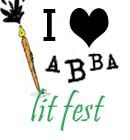This weekend 9th and 10th July a very special event is taking place.
 The Awfully Big Blog Adventure blog is celebrating its 3rd Birthday and holding the very first ever ONLINE LITERARY FESTIVAL, run entirely by children’s authors, and we want YOU to get involved in supporting us!
The Awfully Big Blog Adventure blog is celebrating its 3rd Birthday and holding the very first ever ONLINE LITERARY FESTIVAL, run entirely by children’s authors, and we want YOU to get involved in supporting us!On 9th and 10th July 2011 40 (yes FORTY) children’s authors from the Scattered Authors’ Society, will be bringing you something new and special every half hour from 9.30am to 7.30pm.
There will be:
• Amazing Blogs
• Stunning Videos
• Exciting Giveaways
• Fascinating Interviews
• Mind-boggling Competitions
Join all the fabulous guests & contributors at the exciting ABBA Online Litfest!
To join in the conversation! Follow @AwfullyBigBlog on Twitter, tweet about us on the day and before, using the special hashtag #ABBAlitfest
Crime Central's very own criminal masterminds Anne Cassidy, Gillian Philip, Keren David and Linda Strachan are all taking part, as are some of our favourite contributors.
Look out for Anne Cassidy's blog Post: To Blog or Not To Blog? at 9.30am on SATURDAY morning.
Gillian Philip will be there At 12.30pm on SATURDAY with a Competition: Win 'Bloodstone' and 'Firebrand'
At 2.30pm on SUNDAY Fiona Dunbar & Keren David Video: In Conversation
At 5.00pm on SUNDAY Linda Strachan & Cathy MacPhail Video: In Conversation- tutoring creative writing at Arvon
And there are so many more fabulous authors taking part - There's something different every half hour on each day! See the Full Programme here.
Naturally, there will be virtual champagne and cake on the day, so come and join in on this fantastically fabulous literary party!








